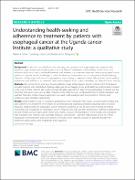| dc.contributor.author | Nakimuli, Esther | |
| dc.contributor.author | Ssentongo, Julius | |
| dc.contributor.author | Mwaka, Amos Deogratius | |
| dc.date.accessioned | 2021-04-29T12:07:32Z | |
| dc.date.available | 2021-04-29T12:07:32Z | |
| dc.date.issued | 2021-02-18 | |
| dc.identifier.citation | Esther, N., Julius, S. and Deogratius, M.A., 2021. Understanding health-seeking and adherence to treatment by patients with esophageal cancer at the Uganda cancer Institute: a qualitative study. BMC health services research, 21(1), pp.1-14. | en_US |
| dc.identifier.issn | 1472-6963 | |
| dc.identifier.uri | http://hdl.handle.net/20.500.12280/2794 | |
| dc.description.abstract | Background: In the low- and middle-income countries, most patients with esophageal cancer present with advanced stage disease and experience poor survival. There is inadequate understanding of the factors that influence decisions to and actual health-seeking, and adherence to treatment regimens among esophageal cancer patients in Uganda, yet this knowledge is critical in informing interventions to promote prompt health-seeking, diagnosis at early stage and access to appropriate cancer therapy to improve survival. We explored health-seeking experiences and adherence to treatment among esophageal cancer patients attending the Uganda Cancer Institute.
Methods: We conducted an interview based qualitative study at the Uganda Cancer Institute (UCI). Participants included patients with established histology diagnosis of esophageal cancer and healthcare professionals involved in the care of these patients. We used purposive sampling approach to select study participants. In-depth and key informant interviews were used in data collection. Data collection was conducted till point of data saturation was reached. Thematic content analysis approach was used in data analyses and interpretations. Themes and subthemes were identified deductively.
Results: Sixteen patients and 17 healthcare professionals were included in the study. Delayed health-seeking and poor adherence to treatment were related to (i) emotional and psychosocial factors including stress of cancer diagnosis, stigma related to esophageal cancer symptoms, and fear of loss of jobs and livelihood, (ii) limited knowledge and recognition of esophageal cancer symptoms by both patients and primary healthcare professionals, and (iii) limited access to specialized cancer care, mainly because of long distance to the facility and associated high transport cost. Patients were generally enthused with patient – provider relationships at the UCI. While inadequate communication and some degree of incivility were reported, majority of patients thought the healthcare professionals were empathetic and supportive. | en_US |
| dc.language.iso | en | en_US |
| dc.publisher | BioMed Central Ltd | en_US |
| dc.relation.ispartofseries | BMC health services research;21(1) | |
| dc.subject | Esophageal cancer | en_US |
| dc.subject | Health-seeking | en_US |
| dc.subject | Adherence to treatment | en_US |
| dc.subject | Access to care | en_US |
| dc.subject | Cancer | en_US |
| dc.subject | Uganda | en_US |
| dc.title | Understanding Health-seeking and Adherence to Treatment by Patients With Esophageal Cancer at the Uganda Cancer Institute: A Qualitative Study | en_US |
| dc.type | Article | en_US |


